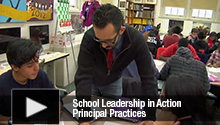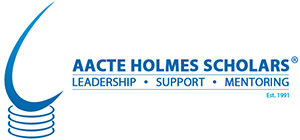23 Jul2015
By Amanda Lester and Rodrick Lucero
Principals’ leadership is a critical factor in schools’ success, and school leader preparation programs play a key role in facilitating that success. But what are the components of programs that effectively prepare emerging principals to serve as leaders of learning in 21st-century schools?
AACTE, in cooperation with a national foundation, is conducting a brief survey of its members to better understand the landscape of university-based principal preparation programs: the context in which they operate; the challenges they face; and the degree to which improvements are seen as important. A report is planned for early 2016 summarizing the findings from this survey as well as others under way.
21 Jul2015
By Kayla Campbell

AACTE will host two webinars this fall on integrating the Common Core State Standards (CCSS) in educator preparation programs, thanks to a grant from the Learning First Alliance’s Get It Right campaign. These 60-minute webinars will highlight AACTE members’ successes and challenges in aligning their programs with CCSS.
Following the recommendations of the National Association of State Boards of Education report Common Themes, Individual Approaches: Six States’ Experiences With New Science Standards, these webinars will focus on four key areas of CCSS implementation: communication strategy, community involvement, policy advancement and alignment, and professional development and capacity building.
06 Jul2015
By Sharon Robinson
As another ambitious teacher preparation innovation captures national attention, I invite you to join me in taking stock of how widespread creative change has become in this field. The Woodrow Wilson National Fellowship Foundation and the Massachusetts Institute of Technology recently announced the launch of their brand-new research laboratory and graduate program to prepare teachers and school leaders. The educator preparation field, already rife with innovation, welcomes the new Woodrow Wilson Academy of Teaching and Learning as the latest partner in a robust entrepreneurial environment.
While I do not embrace the negative rhetoric that accompanied the new program’s announcement, I am keenly interested in the work. In fact, the Academy’s goals are quite aligned with those being addressed by many other educator preparation providers and organizations. Foundation President Arthur Levine and his partners at MIT will find themselves in good company as they pursue their particular reform interests and share their findings.
29 Jun2015
By Kristin McCabe
The model standards of the Interstate School Leaders Licensure Consortium (ISLLC), developed in 1996 by the Council of Chief State School Officers (CCSSO) and last revised in 2008, generated controversy in the field during their most recent revision effort last fall and this spring. The National Policy Board for Education Administration (NPBEA), which convenes an array of stakeholder groups, is partnering with CCSSO to consider the feedback received from the field and make final adjustments to the new standards, now planned for release this fall.
NPBEA was among the groups that approved the original standards nearly 20 years ago and has been involved to some degree in subsequent revisions. Its constituent organizations* all have close connections to the work addressed in the standards, but some of these constituents felt their voices were not heard in the recent standards update.
26 Jun2015
By Jerrica Thurman
AACTE issued a press release June 24 announcing a new Clinical Practice Commission, which has already begun working on an ambitious agenda to better define what constitutes high-quality clinical teacher preparation. Read on to learn more, or contact Vice President Rodrick Lucero, who chairs the commission, for more information.
23 Jun2015
By Shaneé Wangia and DeShawn Sims
A double narrative dominates contemporary discussions of teacher quality, leading to often-contradictory policies that stymie reform efforts. First is the democratic imperative to provide equitable access to a quality education to all students, which calls for broadening the diversity of the teaching force to better reflect student demographics. Second is the push for tightening quality controls such as GPA and testing requirements in teacher preparation programs, which results in a considerably less diverse teaching pool. AACTE Holmes Scholars learned about this paradox firsthand earlier this month during Washington Week as they explored the themes of diversity, equity, access, and accountability with a variety of guest speakers from national organizations.
29 May2015
By Michelle Kotek and Lucy Berrier
Earlier this month, we were excited and honored to attend the symposium “Closing the Gaps: A Policy and Practice Conversation to Advance an Opportunity Agenda,” presented by the National Education Association at the National Press Club in Washington, DC. It was a thought-provoking event, filled with great speakers and compelling strategies for closing gaps in student achievement and opportunity.
Panelists included Linda Darling-Hammond (Stanford University), Robert Balfanz (Johns Hopkins University), Kisha Davis-Caldwell (National Board for Professional Teaching Standards), Ron Ferguson (Harvard University), and many others. These speakers discussed gap-closing strategies, policy levers to support effective practices, and directions the education field will (and should) take in the future. They also consistently emphasized the importance of community engagement.
19 May2015
By Kristin McCabe
The Council of Chief State School Officers (CCSSO) invites feedback on the latest revision of the Interstate School Leaders Licensure Consortium (ISLLC) model standards. Comments are due Friday, May 29.
The update attempts to capture the changing expectations for school leaders, who are increasingly held responsible not only for administrative tasks but also for student learning. The model standards, according to the draft document,
[. . .] clarify the most important work and responsibilities of learning-focused leaders operating in today’s education context. Grounded in both research and effective practice, these standards provide a framework for state departments of education and districts alike to understand how to best prepare, support, and evaluate education leaders in their efforts to help every child reach his or her fullest potential. [. . .] The standards can also inform how schools and districts recruit and cultivate leaders who can build teams that share and distribute the responsibilities required for high levels of student learning and achievement to occur. (p. 3)
18 May2015
By Renée A. Middleton and Rodrick Lucero
The AACTE Board of Directors subcommittee formed to engage in conversation with the Council for the Accreditation of Educator Preparation (CAEP) convened May 5 for its first meeting. All committee members were present: Chair Renée A. Middleton (Ohio University), Jane Bray (Old Dominion University, VA), David Cherry (Whitworth University, WA), John Jacobson (Ball State University, IN), and Carol Vukelich (University of Delaware), as well as Board Chair Mark Ginsberg (George Mason University, VA) and AACTE Vice President Rodrick Lucero.
To start the meeting, Middleton invited Ginsberg to formally address the committee’s charge and scope of work. Ginsberg stated that AACTE continues to recognize and support CAEP as the single accrediting body for educator preparation programs. He reiterated that the committee was established to engage with the CAEP leadership to address concerns stated in the February AACTE Board of Directors resolution, which reflected ongoing communication from AACTE member institutions with respect to CAEP.
12 May2015
By Tim Finklea

A new series of videos presents successful school leaders in action, demonstrating five key practices found to be effective in improving teaching and learning. The videos are free resources that may be a helpful tool for principal preparation programs.
11 May2015
By Linda McKee

Since the launch of the edTPA National Academy consulting service in January, dozens of consultants have been trained and deployed across the country to lead workshops and provide other support for edTPA implementation. In addition, once a consultant is requested through the “Seek Support” feature, a new searchable database is now available to help programs make the right match. AACTE and the Stanford Center for Assessment, Learning, and Equity recently announced the official launch of the service in a press release:
07 May2015
By Willys Michel and Whitney Watkins

As the 2014-2015 AACTE Holmes Scholars® Council passes the torch to the new and excited cohort of executives, there are many people to thank. First, scholars themselves have played a pivotal role in the support of the past Council leadership, as well as serving a great cause: diversifying the American professoriate. In addition, the 2014-2015 Council would like to extend gratitude to the National Association of Holmes Scholars Alumni (NAHSA) and to various members of AACTE. The new Council looks forward to the continued support of all aforementioned networks.
05 May2015
By Donna Sacco
At last month’s conference of the American Educational Research Association, I attended a joint business meeting of two special interest groups—Professional Development School Research and Supervision and Instructional Leadership—focused on the role of supervision of instruction in professional development schools (PDSs) from preservice to retirement. Panelists included AACTE’s Linda McKee, senior director of performance measurement and assessment policy; Daisy Arredondo-Rucinski, University of Alabama; and Bernard Badiali, Pennsylvania State University.
04 May2015
By Jerrica Thurman

AACTE joins the National Education Association (NEA) and the National Parent Teacher Association (PTA) in celebrating terrific teachers during National Teacher Appreciation Week, May 4-8, and National Teacher Day, May 5.
“Teachers work every day to meet the needs of our students, often in the face of significant challenges,” said AACTE President/CEO Sharon P. Robinson. “We are so grateful for their dedication.”
28 Apr2015
By Lucy Berrier

2015 National Teacher of the Year Shanna Peeples
It was my distinct honor and privilege to serve as AACTE’s representative on the Council of Chief State School Officers (CCSSO) National Teacher of the Year Selection Committee this year.
Reading through the 56 applications from every U.S. state and territory was such a joy, as every single candidate is truly using amazing talents and hard work to educate students. Programs such as CCSSO’s National Teacher of the Year program are an important reminder that in the midst of policy debates, budget cuts, and constantly increasing scrutiny, teachers are going to work every day and touching the lives of their students in unimaginable ways.












